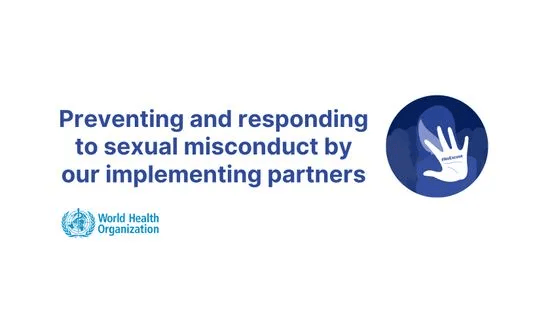
Preventing and responding to sexual misconduct by our implementing partners: Introductory course
- Explain the importance of the UN Protocol and IPs PSEA capacity Assessment Process;
- Brief and guide the IPs along the process;
- Assess and verify the IPs' self-assessments;
- Propose and monitor the joint capacity-strengthening implementation plans;
WHO has an obligation to ensure that all those who work for WHO and our implementing partners (IPs) take measures to safeguard against sexual misconduct. This one-hour course explains the importance and the tools available to work with our IPs to assess and strengthen their capacity to respond to sexual misconduct.
WHO has an obligation to ensure that all those who work for WHO and our implementing partners take measures to safeguard against sexual misconduct. The PSEA Capacity Assessment for Implementing Partners is an essential tool to ensure that our implementing partners have the minimum standards of protection against sexual exploitation and abuse in place. Based on the Inter-Agency Standing Committee Harmonized Tool (UN Implementing Partner PSEA Capacity Assessment), used by UN agencies, this short training will walk you through the process, steps, and requirements in the PSEA assessment of new and existing implementing partners.
Approximate course duration: 1 hour.
Languages
This course is available in the following languages: English.
Assessment & Awards
You will receive a Confirmation of Participation upon completing all the modules in this course. Please note that this award does not serve as a professional qualification.
- WHO PRS regional coordinators, PRS technical officers and focal points, programme managers and officers who are working with implementing partners.
Guidance note
The content of this course has been validated, verified, and is owned by the WHO Prevention of and Response to Sexual Misconduct (PRS) unit. This course is not a WHO Academy co-produced course. In case of any concerns or feedback on the course content, please share your feedback in the survey form at the end of this course.
Browser and device compatibility
For the best experience, we recommend using the latest version of Chrome, Firefox, Safari, or Microsoft Edge to access the courses.
Produced by the WHO Prevention of and Response to Sexual Misconduct (PRS) team.

